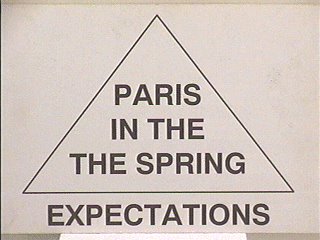Pattern Matching
Humans are very good at pattern matching. We do it all the time, whether understanding speech, recognizing faces or reading words – we recognize the patterns. We beat computers hands down in pattern matching (speech recognition software has been in development for over 50 years – the US military was funding research into voice to text systems back in the 1940s).
Given the amount of data and processing involved in pattern recognition, we have developed automatic error correction – i.e. we automatically correct small errors in patterns (an interesting aside of this is that a non-native speaker of a language is much better at proof reading than a native speaker).
Perhaps this automatic correction is to maintain order in out little universe, or maybe it is because we only superficially exam the data before applying a pattern and order to it.
Read the following words:
Did you notice the error?
Most people for whom English is a native tongue, will miss the second the. The brain just filters it out. While the brain can filter out duplications, it can also insert expected words – perhaps you have dropped an article, the brain is perfectly capable of inserting it and you won’t notice.
Here is another example: count the number of Fs in the following paragraph:
FINISHED FILES ARE THE
RESULT OF YEARS OF SCIENTIFIC
STUDY COMBINED WITH THE
EXPERIENCE OF YEARS
Did you get it right?
Probably not, you likely counted 3 Fs. There are in fact 6.
Again, the brain does not match the Fs in the words OF because it sees the word as a single item not a sequence of two letters.
Humans look for patterns in everything. You could substitute meaning for pattern. We have a tendency to want to generalize particular sequences of events as significant – I washed my car and it rained, I do well on tests when I wear something green, my horoscope said something was going to happen today, etc.
How often do you unconsciously establish cause and effect for things that have no causal relationship? How often do you try to recreate something by following the same steps and sequence?
Retracing our steps can help us jog our memory, but it can also become a superstition, where we believe that a particular sequence of events influences outcome.
You can take a test and see how perceptive you are here. I got 19 out of 20 (but this is more because I've seen many of these things before and knew what they were testing - I don't consider myself more intelligent than others, just better read than most).
Image grabbed from here.
Given the amount of data and processing involved in pattern recognition, we have developed automatic error correction – i.e. we automatically correct small errors in patterns (an interesting aside of this is that a non-native speaker of a language is much better at proof reading than a native speaker).
Perhaps this automatic correction is to maintain order in out little universe, or maybe it is because we only superficially exam the data before applying a pattern and order to it.
Read the following words:
Did you notice the error?
Most people for whom English is a native tongue, will miss the second the. The brain just filters it out. While the brain can filter out duplications, it can also insert expected words – perhaps you have dropped an article, the brain is perfectly capable of inserting it and you won’t notice.
Here is another example: count the number of Fs in the following paragraph:
FINISHED FILES ARE THE
RESULT OF YEARS OF SCIENTIFIC
STUDY COMBINED WITH THE
EXPERIENCE OF YEARS
Did you get it right?
Probably not, you likely counted 3 Fs. There are in fact 6.
Again, the brain does not match the Fs in the words OF because it sees the word as a single item not a sequence of two letters.
Humans look for patterns in everything. You could substitute meaning for pattern. We have a tendency to want to generalize particular sequences of events as significant – I washed my car and it rained, I do well on tests when I wear something green, my horoscope said something was going to happen today, etc.
How often do you unconsciously establish cause and effect for things that have no causal relationship? How often do you try to recreate something by following the same steps and sequence?
Retracing our steps can help us jog our memory, but it can also become a superstition, where we believe that a particular sequence of events influences outcome.
You can take a test and see how perceptive you are here. I got 19 out of 20 (but this is more because I've seen many of these things before and knew what they were testing - I don't consider myself more intelligent than others, just better read than most).
Image grabbed from here.


Comments
Bee: The perception questions are tricky, they rely on exploiting perception loopholes. I hope you took the time to read the explanations for each question and have learned from it.
Understanding how we perceieve is, I think, important in order to ensure we can trust our perceptions and to know where potential weaknesses are.
But one thing I learnt from this test is, never make any judgement or conclusion when I am tired... they might be wrong. :P
I got the question on the chili peppers wrong. I had never before seen the word nocireceptor
I am a definate pattern seeker. I think it can be a problem sometimes because I tend to want to put people and events into presubscribed "boxes". Interesting post.